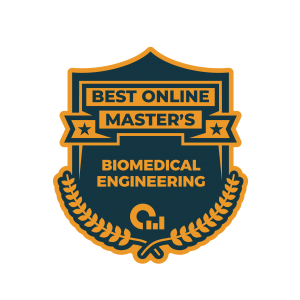Are you ready to make the future healthier for more people? Be the one who takes the medical world forward with an online master’s in biomedical engineering.

Biomedical engineering is found at the nexus of healthcare and engineering. This field is at the forefront of transforming the medical world to reflect the innovation and direction of the future. For instance, biomedical engineers are the brains behind prosthetic limbs, stem cell research, and biomedical signaling, to name just a few innovations.
In other words, as a biomedical engineer, you can have a significant impact on how people feel, how they interact with their environment, and the overall quality of their lives. It’s a great way to make a living – and to have a positive influence on the world in which we live.
If that sounds like something of interest to you, read on to learn how to get a biomedical engineering online degree.
What is an Online Biomedical Engineering Degree?
First and foremost, you need to get an undergraduate degree in biomedical engineering or a related program, like health sciences, biochemistry, or microbiology. These degrees take about four years to complete, provided you study full-time. Thankfully, you don’t need to take the MCAT or go to medical school!
During your studies, you’ll take general education courses in math, the humanities and arts, physical education, and the like. But you’ll also take courses specific to biomedical engineering.
For example, your undergraduate studies will introduce you to topics such as:
- Biomeasurements and biomechanics
- Biosignals and systems
- Biomedical computing
- Implantable materials and biological response
- Quantitative physiology
You might also take immunology, informatics, and biotechnology. It’s likely you’ll participate in biomedical research, take a biomedicine course, and study molecular biology, too.
Of course, this is just a small sampling of the courses you’ll take. Clearly, though, the focus is very heavily on engineering and biology!
Earning an online biomedical engineering masters is the next crucial step in this rewarding and dynamic career. The field of biomedical engineering is wide-ranging. You have to be an expert in not one, but two fields: biology and engineering. But the rewards are immense. You’ll be on the forefront of streamlining healthcare and medical services.
You can take this degree in a number of different directions. For example, if you pursue bioinstrumentation, you might end up developing a new x-ray machine that takes more exact imaging. Or if you’re interested in biomaterials, your focus might involve tissue repair or hip replacement technology. An online Master’s in Biomedical Engineering will give you the foundations from which to specialize in your area of interest.
Regardless of the specialty you pursue, you can expect to spend around two years in graduate school. Some universities offer the opportunity to complete a bachelor’s degree and a master’s degree in one program, which can help reduce the time needed to graduate. In other cases, a standalone graduate program might take two-and-a-half to three years to complete.
Common courses you might take in a graduate program in biomedical engineering include:
- Biosimulation
- Medical sciences
- Physiological control systems
- Cellular systems engineering
- Systems biology
Again, this is just a small sampling of courses that you’ll take in an online biomedical engineering degree. The bulk of the coursework will be done in your area of specialty, for which there are many options. For example, you might focus on:
- Biomedical systems and imaging
- Neuroengineering
- Pediatric engineering
- Bioinformatics
- Biomaterials and tissue engineering
Once you get accepted into a program, you can expect to take around two years to complete your degree. Most curricula cover 30 to 40 credits in total.
For a general Engineering Master’s, see OSR’s ranking here.
How Much Can You Earn With a Biomedical Engineering Degree Online?
You’ve chosen the right career if you’re aiming to make a comfortable living. According to the Bureau of Labor Statistics, biomedical engineers make anywhere from $66,680 to $154,750 per year.
The amount you ear depends on a variety of factors, not the least of which is your level of education and expertise. If you get an advanced biomedical science degree and training, and if you get more job experience, the salary that you can command increases, often significantly.
Here’s a tip: the money is in manufacturing. Biomedical engineers who are devoted to the development of new instruments typically make around $108,690 per year. Biomedical engineering is a career that is devoted to the next big thing, so it just makes sense that the professionals who are researching groundbreaking medical technologies would earn more.
What is Required for an Online Master’s in Biomedical Engineering Degree?
As is pretty obvious by now, biomedical engineering online programs are not for the faint of heart. You will tackle some next-level concepts. The online programs on this list are just as rigorous as the programs held on-campus. That means you should anticipate preparing the following for your application:
- GPA of at least 3.0 from a 4-year undergraduate program
- Minimum GRE score of 156 (verbal) and 159 (quantitative)
- Work experience or undergraduate research experience
Keep in mind, though, that there are always exceptions to the rule. For example, some schools offer waivers for the GRE if you have work experience in the field. Others don’t require it at all! Some schools might require you to write a statement of purpose or a personal statement or sit for an interview with an admissions committee. Each school is a little different, so be sure you familiarize yourself with each school’s specific requirements.
What are the Best Online Master’s in Biomedical Engineering Degrees?
OSR uses six data points to rank programs. There are three school-wide and three program specific criteria. For school-wide, OSR uses student satisfaction, admission rates, and the number of programs the school offers online. For program specific, OSR checks the median debt of graduates from that program, how many degrees are offered within that program’s umbrella department, and what percentage of students at that school graduated from that department.
The six statistics are displayed by each school. The sliding bar under each statistic represents how that school compares to other US institutions so you can easily compare our list of masters biomedical engineering online programs. “Not reported” means a school did not release that information to the US Department of Education. A more detailed description of the OSR process can be found on the methodology page.
Let’s have a look at the best online bioengineering degree programs!














